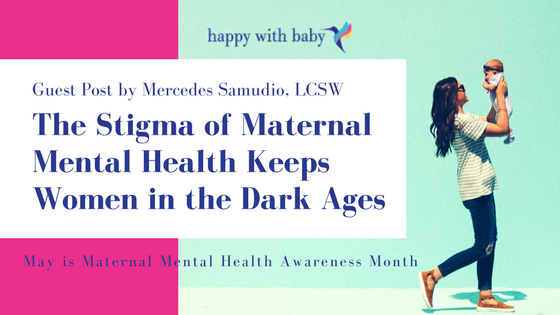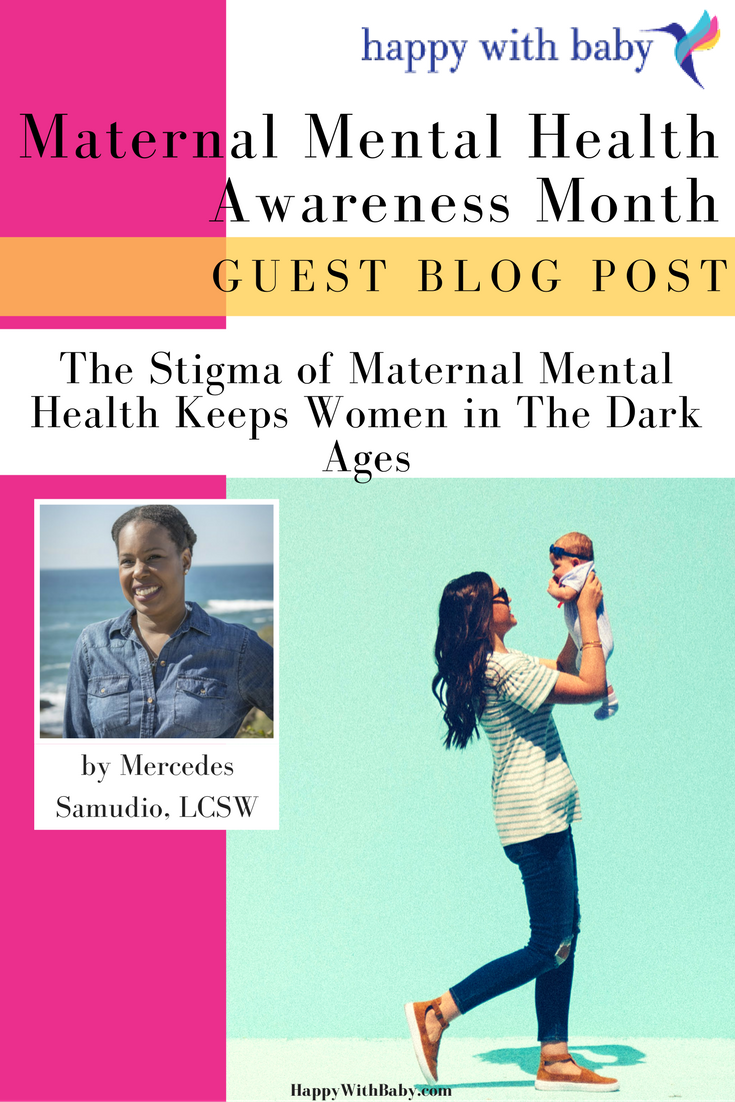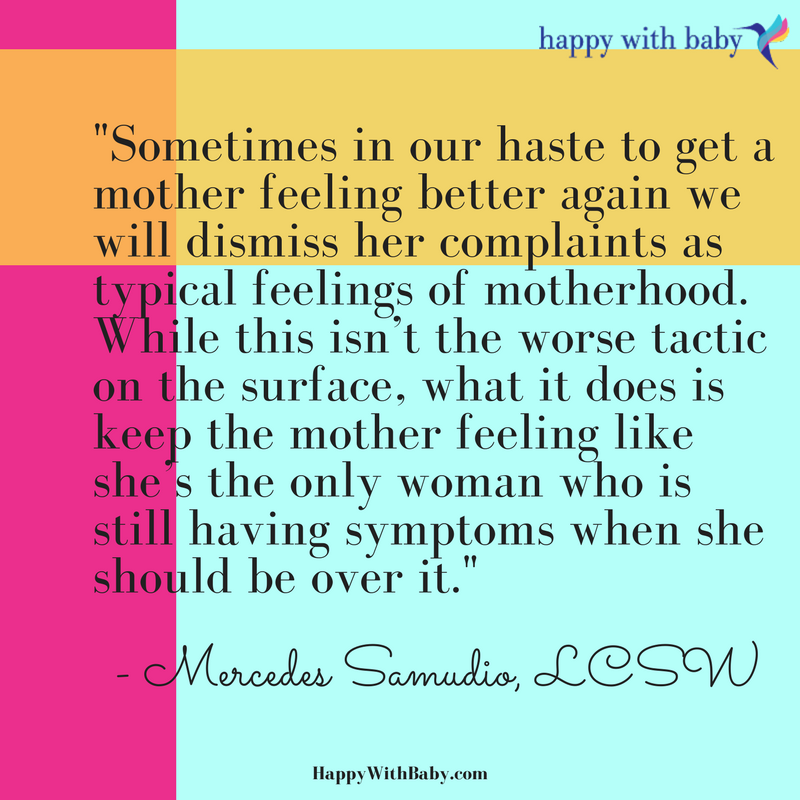Guest Blog: The Stigma of Maternal Mental Health Keeps Women in The Dark Ages

Written by Mercedes Samudio, LCSW
The recent coverage of celebrity mothers, like Chrissy Teigen, discussing how they came to discover that the unsettling feelings they experienced after giving birth was called postpartum depression sheds light on an interesting dialogue we need to have with women: becoming a mother is not always going to be a beautifully exciting time in a mother’s life; and that’s okay. The idea that a mother should love her new baby - or even the more seemingly inclusive sentiment that every woman has the baby blues - perpetuates the myth that women are supposed to be emotionally ready to be a mother by the time the baby comes into the world. It’s that myth that continues to fuel the stigma of maternal mental health and impedes women from getting the support that they need to develop a healthy parenting identity.

In my work with parents, one of the biggest barriers to their connection to themselves and their children are the myths that surround them about how they are supposed to act, and how they are supposed to feel. Mothers especially have a difficult time because our society labels women as the nurturers of the family. The only issue with this distinction is that it puts mothers in a precarious position: they are seen as the ones to nurture the family and care for the children, but who will be there to care for them when they are not able to perform those duties? The myth of the baby blues does nothing to help this assumption along either. Most people who are unfamiliar with maternal mental health will only give a mother so long before their patience begins to wear thin on a mother expressing difficulties connecting and caring for her family. When we allow these ideas and myths to continue we inadvertently dismisses the importance of women being able to care themselves and their mental health.
But, here’s the honest truth: how can we be more supportive of women and their transition into motherhood? What do we say to a mother when we know that there are going to be sleepless nights, fatigue, and emotional upheaval?
The long and short answer is that we learn to listen to mothers when they talk about their symptoms. Maternal mental health symptoms show up differently for each woman. When we judge or shame a mother for expressing her symptoms, it sets up a false set of expectations of when she should be over these feelings, and it makes her feel abnormal for having these symptoms.
How can a mother be present for herself or for her child when she is too busy worrying about how her symptoms make her abnormal or how she may be offending others by having these symptoms?
When it comes to being more supportive to mothers, advocating for more awareness of maternal mental health, and stopping the perpetuation of the stigma of maternal mental health, I encourage us to start with these two strategies:
#1. Listen

Yes, the simplest solution is often the hardest. Sometimes in our haste to get a mother feeling better again we will dismiss her complaints as typical feelings of motherhood. While this isn’t the worse tactic on the surface, what it does is keep the mother feeling like she’s the only woman who is still having symptoms when she should be over it. Many instances of maternal mental health symptom - like depression, anxiety, and other mood disorders - are treatable when diagnosed and services are provided. However, those same instances are often swept under the rug by mothers who have been told that she will get over it eventually. When you listen to a mother, you give her the space to talk about what’s going on for her. You don’t have to be a mental health professional. But, just listening helps you to hear them out and you can support them in seeking support.
#2 Offer Support

There are time when even the mother experiencing these symptoms doesn’t know how to express or talk about what’s going on. She may complain about sleepless nights, not wanting to be around her baby, or even not wanting to get out of bed. In these moments, listening is great. But, so is offering support. Letting a new mother sleep in can be just as beneficial as seeing a professional in some instances. We all know that when we don’t sleep we are running on empty, and for new mothers the effects of no sleep is compounded with the other changes in her body and her hormones. Offering to watch the baby while she naps, to go to the grocery store, to do light housekeeping, etc.: all these types of offerings help a mother get the rest she needs to reflect on what may be going on with her body and her emotions. And, here’s another idea: if you cannot offer support, don’t get in the way of the mother who accepts this support in the form of judging, shaming, or sharing stories of how you raised three kids without help.
While these are not the most clinical strategies for managing maternal mental health symptoms, they are needed to help mothers feel less stigmatized and less shamed for not being overjoyed at their new identity. There is much research and even more resources for mothers to utilize to get support, but if those around her continue to make her feel bad for experiencing these symptoms she will never seek out these services.
When we continue to stigmatize maternal mental health and the transition into motherhood with fanciful myths of how happy she should be in becoming a mother, we keep women away from the resources and services that can help her develop a healthy parenting identity.
ABOUT MERCEDES SAMUDIO, LCSW:

Mercedes Samudio, LCSW is a parent coach, speaker, and author who helps parents and children communicate with each other, manage emotional trauma, navigate social media and technology together, and develop healthy parent-child relationships. Over the course of her career, she has worked with adoptive families, foster families, teen parents, parents navigating the child protective services system, and children living with mental illness. Mercedes started the #EndParentShaming movement as well as coined the term Shame-Proof Parenting – using both to bring awareness to ending parent shame. Mercedes is a leading parenting expert and has an amazing following on social media that allows her to reach the hearts of thousands of parents who feel heard and seen on their parenting journey. She has been featured on The Huffington Post, US News and Report, Woman’s Day, LA Parent Magazine, CBS LA, and Kids In The House. Mercedes seeks to empower parents to believe that they are already great guides for raising healthy and happy children. You can read more about her parenting expertise at http://shameproofparenting.com.
CONNECT WITH MERCEDES:
Instagram: http://www.instagram.com/ShameProofParenting
YouTube Channel: http://www.youtube.com/ShameProofParenting
Subscribe
Sign up to get the latest weekly blogs sent straight to your inbox


0 comments
Leave a comment
Please log in or register to post a comment